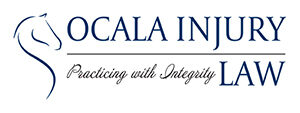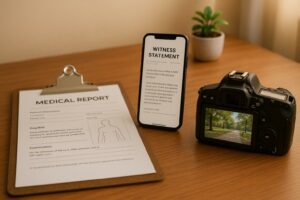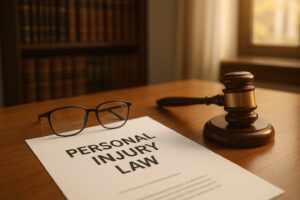Accidents can disrupt your life, but personal injury attorneys are here to help. They fight for fair compensation, handle legal details, and guide you through the process so you can focus on recovery. Here’s what they do:
- Case Review: Evaluate medical records, accident reports, and evidence to determine claim strength.
- Evidence Collection: Secure time-sensitive materials like photos, videos, and expert opinions.
- Insurance Negotiation: Document damages (medical bills, lost wages, pain) to secure fair settlements.
- Court Representation: Prepare clients for trials if settlements fail, ensuring their rights are protected.
In Ocala, many attorneys offer free consultations to help you understand your options. Whether it’s negotiating with insurers or representing you in court, their goal is to secure compensation for your injuries and losses.
First Steps: Case Review and Consultation
When clients seek legal assistance, their case undergoes a detailed review to develop a strategy and determine if the claim has a strong foundation.
Determining Case Merit
During the consultation, personal injury attorneys focus on key elements to evaluate the strength of a case:
- Medical Documentation: Examining injury reports, treatment records, and expert opinions to assess the extent of harm.
- Accident Reports: Reviewing police reports, workplace incident forms, or property damage assessments for critical details.
- Evidence Quality: Analyzing photos, videos, witness statements, and other supporting materials.
- Liability Factors: Establishing responsibility and proving negligence.
- Statute Limitations: Ensuring the claim is filed within Florida’s legal deadlines.
At Ocala Injury Law, attorneys provide free initial consultations, carefully reviewing all available evidence and records to determine the claim’s strength. Once the case’s viability is confirmed, they guide clients through the next steps with clear and actionable advice.
Setting Client Expectations
After determining that a case has potential, attorneys ensure clients have a clear understanding of the legal process. This includes:
- A step-by-step overview of the process, from preparation to negotiations, and litigation if necessary, while noting that timelines depend on the case’s complexity.
- Explaining possible compensation types, such as reimbursement for medical bills, lost wages, property damage, and compensation for pain and suffering.
- Outlining how the attorney will keep clients informed, the level of involvement required, fee structures, and any potential challenges that may arise.
Building the Case: Evidence Collection
Case Investigation Steps
Personal injury attorneys act quickly to secure time-sensitive evidence, often issuing preservation letters within 48 hours. This ensures vital materials, like surveillance footage with short retention periods, are protected.
To recreate accident scenes with precision, attorneys use 360° LIDAR scanners. These tools generate highly accurate digital models, essential for both negotiations and courtroom presentations.
Collaboration with experts plays a key role in building strong cases. Medical specialists track injury progression through imaging studies, while accident reconstruction experts develop detailed scene models using advanced tools. Biomechanical engineers contribute by analyzing impact forces, injury patterns, hazard durations, and movement trajectories with specialized software.
Evidence Management
Proper handling of evidence is critical to ensure it remains admissible and reliable. Digital evidence is managed using strict forensic IT protocols, as shown below:
| Evidence Type | Management Protocol | Verification Method |
|---|---|---|
| Digital Photos | GPS-tagged metadata | Hash verification |
| Medical Records | AES-256 encryption | Blockchain timestamps |
| Video Footage | Secure cloud storage | Audit logs |
| Witness Statements | Video-recorded depositions | Real-time transcription |
Maintaining a clear chain of custody is essential. Federal courts require ISO 17025-compliant protocols for handling DNA evidence in assault-related injury cases. This includes dual signatures, tamper-evident seals, and climate-controlled storage for biological samples.
For more complex cases, attorneys rely on relational databases to organize evidence by category and relevance. Medical records are coded by body system, and photographic evidence is geotagged on interactive maps. This organization ensures quick and efficient access during negotiations or trial preparation.
Emerging technologies also play a role in evidence preservation. Tools like multispectral imaging can uncover hidden traces of evidence, while AI-powered document review systems identify gaps in evidence collection. These advancements help attorneys build well-supported cases while adhering to strict legal standards.
Ocala Injury Law integrates these methods to uphold case integrity and deliver results.
Working with Insurance Companies
Once evidence is gathered, attorneys focus on dealing with insurance companies to ensure clients receive the compensation they deserve.
Getting Fair Compensation
Attorneys rely on well-prepared negotiation tactics to secure compensation that fully addresses a client’s damages. They carefully document everything – itemized medical bills, proof of lost wages, repair estimates, and evidence of pain and suffering. This detailed approach helps ensure all costs are accounted for. If an insurer offers a low settlement, attorneys use clear evidence to show the direct link between the injuries and the accident. Medical narrative reports, which summarize diagnoses, treatments, and long-term effects, play a key role in reinforcing these claims.
Settlement vs. Trial Options
Once negotiations with insurers are complete, the next decision is whether to settle or go to trial. Attorneys weigh factors like the strength of the case, available evidence, and potential compensation. Settlements are often quicker, less expensive, and less stressful. However, when insurers fail to offer a fair deal, attorneys may take the case to court, even though trials can be more time-consuming, costly, and unpredictable.
At Ocala Injury Law, attorneys use settlement matrices to evaluate insurance company patterns and historical data. This helps set realistic expectations and refine negotiation strategies. Throughout the process, proving liability and presenting well-documented damages – often with support from expert testimony – remains critical to achieving fair outcomes.
sbb-itb-68ed374
Court Representation and Client Support
Client Communication
Effective communication ensures clients stay informed and reassured during court proceedings. Attorneys keep clients updated regularly, break down complicated legal jargon, and provide honest expectations about timelines and possible outcomes. This approach builds on earlier case evaluations, ensuring clients remain clear and informed throughout the process.
Lawyers also help clients prepare for depositions, explain their roles during court appearances, and guide them through required appointments and documentation. They assist in making well-informed decisions about settlements. Keeping detailed records of all interactions helps address any client concerns effectively.
Wrapping Up
Personal injury attorneys play a key role in achieving favorable outcomes by evaluating cases, gathering evidence, and negotiating settlements. Their ability to assess cases thoroughly and advocate effectively during insurance negotiations or court proceedings can significantly impact the compensation clients receive.
By handling complex paperwork, meeting deadlines, and navigating legal processes, they allow clients to focus on their recovery. Their deep understanding of personal injury law, along with their connections to medical professionals, investigators, and insurance companies, is crucial throughout the process.
At Ocala Injury Law, the focus is on providing personalized support and ethical representation. This ensures every case gets the attention it deserves, helping clients overcome legal challenges and emotional hurdles while working toward fair compensation and justice.
FAQs
How can I prepare for my first meeting with a personal injury attorney?
To make the most of your initial consultation, start by gathering all relevant documents, such as medical records, accident reports, photos, and any correspondence with insurance companies. These details will help the attorney evaluate your case more effectively.
Be ready to discuss the specifics of your case, including the timeline of events, any injuries sustained, and how the incident has impacted your life. Prepare a list of questions you’d like to ask about the legal process, potential outcomes, and the attorney’s experience with similar cases.
If you’re considering Ocala Injury Law, they offer free consultations and prioritize personalized attention to ensure you feel supported and informed every step of the way.
How do personal injury attorneys calculate the compensation their clients should seek?
Personal injury attorneys determine compensation amounts by evaluating several factors unique to each case. These include the severity of the injury, medical expenses (past and future), lost wages, pain and suffering, and any long-term impact on the client’s quality of life. They may also consider property damage or other financial losses related to the incident.
Attorneys use their legal expertise, case precedents, and, when necessary, input from medical and financial experts to estimate a fair and just compensation amount. Their goal is to ensure clients receive the financial support they need to recover and move forward with their lives.
What factors determine whether a personal injury case should settle or go to trial?
Deciding whether to settle a personal injury case or proceed to trial depends on several factors. Key considerations include the strength of the evidence, the potential compensation amount, the willingness of both parties to negotiate, and the time and cost involved in going to court. Personal injury attorneys carefully evaluate these elements to recommend the best course of action for their clients.
Settling a case often provides a faster resolution and avoids the unpredictability of a trial, while going to trial may be necessary if a fair settlement cannot be reached. A skilled attorney, like those at Ocala Injury Law, can guide you through this decision, ensuring your rights are protected and your best interests are prioritized.




